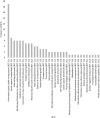Healthcare provider-led interventions to support medication adherence following ACS: a meta-analysis
- PMID: 29344366
- PMCID: PMC5761293
- DOI: 10.1136/openhrt-2017-000685
Healthcare provider-led interventions to support medication adherence following ACS: a meta-analysis
Abstract
We conducted a systematic review and meta-analysis to determine the effectiveness of healthcare provider-led (HCPs) interventions to support medication adherence in patients with acute coronary syndrome (ACS). A systematic search of Cochrane Library, Medline, EMBASE, PsycINFO, Web of Science, IPA, CINAHL, ASSIA, OpenGrey, EthOS, WorldCat and PQDT was undertaken. Interventions were deemed eligible if they included adult ACS patients, were HCP-led, measured medication adherence and randomised participants to parallel groups. Intervention content was coded using the Behaviour Change Technique (BCT) Taxonomy and data were pooled for analysis using random-effects models. Our search identified 8870 records, of which 27 were eligible (23 primary studies). A meta-analysis (n=9735) revealed HCP-led interventions increased the odds of medication adherence by 54% compared to control interventions (k=23, OR 1.54, 95% CI 1.26 to 1.88, I2=57.5%). After removing outliers, there was a 41% increase in the odds of medication adherence with moderate heterogeneity (k=21, OR 1.41, 95% CI 1.21 to 1.65, I2=35.3%). Interventions that included phone contact yielded (k=12, OR 1.63, 95% CI 1.25 to 2.12, I2=32.0%) a larger effect compared to those delivered exclusively in person. A total of 32/93 BCTs were identified across interventions (mean=4.7, SD=2.2) with 'information about health consequences' (BCT 5.1) (19/23) the most common. HCP-led interventions for ACS patients appear to have a small positive impact on medication adherence. While we were able to identify BCTs among interventions, data were insufficient to determine the impact of particular BCTs on study effectiveness.
Prospero registration number: CRD42016037706.
Keywords: acute coronary syndrome; medication adherence; meta-analysis; systematic review.
Conflict of interest statement
Competing interests: None declared.
Figures





References
Publication types
LinkOut - more resources
Full Text Sources
Miscellaneous
